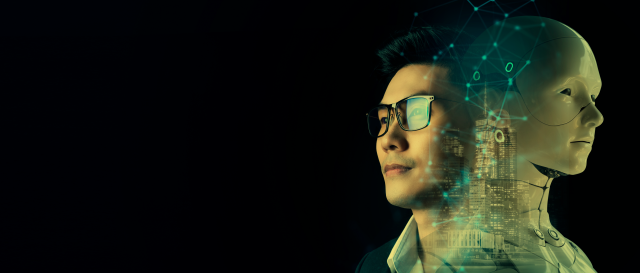Short answer: no!
As Artificial Intelligence (AI) continues to transform various industries, including the educational landscape, it is important to address the concern that AI might replace teachers altogether.
However, it is important to recognize that AI is not intended to replace human teachers, but rather enhance their capabilities and create more effective learning environments.
A teacher’s expertise, empathy, and human touch are invaluable and irreplaceable, even in the era of AI. According to an Education World article, mirror neurons are one of the main reasons we can't replace teachers with robots. These neurons are responsible for understanding and empathizing with others.
An important aspect of learning is observing and imitating. In other words, humans learn best from other humans. And humans bring creativity, passion, and emotional support to the classroom.

The Role of Teachers in the Age of AI, a Valued and Indispensable Presence
Here's why AI isn’t capable of replacing human teachers:
1. Personalized Attention
AI can provide personalized recommendations and support, but it cannot replace the human touch and empathetic understanding that teachers bring to the learning process. Teachers play a vital role in nurturing students' emotional intelligence, critical thinking skills, and social interactions, as well as having the ability to inspire and motivate learners.
2. Complex Learning Tasks

While AI can handle certain aspects of teaching, such as grading and content delivery, it lacks the capacity to navigate the complexities of human cognition fully. Teachers are essential for guiding students through complex problem-solving, fostering creativity, and facilitating discussions. These higher-order cognitive skills require human guidance, encouragement, and facilitation.
3. Social and Emotional Learning
While AI can offer personalized learning experiences and intelligent support, it cannot replicate the unique bond between teachers and students. The human connection that teachers foster goes beyond the imparting of knowledge, it involves thoughtful development of social skills, emotional support, mentorship, empathy, and emotional intelligence.
These aspects require human interaction and guidance that AI is unable to replicate.
4. Human Motivational Tactics
Encouraging students to learn, practice, and grow is a skill that is currently beyond the scope of artificial intelligence.
High-quality human teachers have a wide range of motivational tactics they can use to keep students motivated throughout the school year. Even young students realize quickly that penalties and rewards delivered by computers aren't the same as the ones they experience from a teacher, alongside their peers.
As machine learning and AI continue to advance, human interaction will become even more important. Only teachers can truly understand the nuances of what is happening in their students’ minds and emotions in the classroom.

Benefits of Adopting AI in Education
AI in education reduces administrative burdens, enhances efficiency, and enables educators to focus more on high-value tasks, such as individualized instruction, mentoring, and fostering critical thinking skills.
It empowers educators to deliver personalized learning experiences and improves overall educational outcomes. Other benefits to the eLearning industry and businesses, educators and learners include:
- Online learning is becoming more and more inclusive in how it can offer education to remote or underserved areas where traditional resources may be limited, reducing inequality and improving graduation rates.
- Online courses can be finished nearly 60% faster than in-person lessons, supporting lifelong learning by providing personalized recommendations for upskilling and reskilling.
- It can save educators valuable time and effort. For example, a school district in the USA used data science to analyze and optimize their class schedule during the Covid pandemic.
- AI-driven solutions can offer cost savings in various areas, including content creation, administrative tasks automation, and personalized instruction. Once developed, AI-powered tools can scale to serve a large number of learners simultaneously, making education accessible and affordable on a broader scale.
- It can reduce the manual grading workload for teachers which allows them to focus on more qualitative assessments.
- It can help in creating balanced and conflict-free schedules, saving time for both students and administrators.
- AI speeds up content creation and ensures a consistent quality of materials.
- The integration of AI with emerging technologies, such as virtual reality and augmented reality, created exciting opportunity for immersive and interactive learning experiences.
- Adaptive AI can ensure that each learner receives content that aligns with their needs and optimizes their learning experience.
- Immediate feedback and support can enhance the student’s learning experience outside of traditional classroom settings.

Conclusion

To teachers, rest assured that AI will not replace you! The human qualities you bring to the teaching profession are irreplaceable and indispensable. Your ability to connect with students, nurture critical thinking, and create inclusive learning environments remains at the core of education.
At The Really Great Teacher Company we fully embrace the adoption of AI into many aspects of our business, but we continue to deeply value the contribution and impact of our teachers. With ongoing personal and professional development initiatives we ensure that our teachers continue to grow and improve their teaching skills, tactics and methodologies to provide that personalized attention, assigning complex learning tasks, stimulate students’ social and emotional wellbeing, and keeping them motivated.
AI is just a powerful tool that can support and enhance your teaching practice, offering personalized learning, automating administrative tasks, and providing data-driven insights. By embracing AI as an ally, you can continue to inspire, motivate, and make a lasting impact on the lives of your students.
It is the combination of your human expertise and the capabilities of AI that will shape the future of education.
